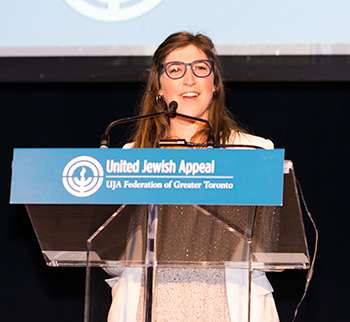TORONTO — In nearly every sense, Mayim Bialik is an atypical Hollywood star.
It would be difficult to come away with a different impression of the accomplished actress, writer, scholar and observant Jew after listening to her keynote speech at the Feb. 2 UJA Federation of Greater Toronto’s annual campaign 2015 closing event.
Held at downtown event space The Carlu and attended by 800 campaign donors, the evening featured speeches and a dessert reception, all to celebrate the $53.1 million – the product of about 16,000 gifts – raised so far to support UJA projects in the 2015 fiscal year (donations are expected to roll in until the fiscal year begins in July).
Funds from the campaign, which launched in September, will go toward Jewish social service delivery in the GTA, as well as community building, education, strengthening bonds with UJA’s partner agencies in Israel and advocacy through the Centre for Israel and Jewish Affairs.
The $53.1 million outpaces by several hundred thousand dollars the sum raised by this time last year for Campaign 2014, and it doesn’t include the $5.6 million collected for last summer’s Israel emergency relief fund, federation officials said.
Bialik, 39, was an appropriate guest, calling herself a steadfast Zionist and a “personal product of [UJA] federation” growing up in California.
Best known for her roles as the young Bette Midler in the film Beaches, the title character on television sitcom Blossom and, currently, as Amy Farrah Fowler on the popular sitcom The Big Bang Theory, Bialik’s early influences included attending Jewish camp on a federation subsidy.
“Because of federation, I was able to attend Jewish camp for five weeks a year, to meet other Jews and learn,” she told the audience. “It’s because of people like you who gave to people like me, whose family didn’t have money for camp.”
A self-described outsider in the television industry, Bialik spoke eloquently about her upbringing, her family’s Jewish history, her career trajectory and the Jewish values that have “kept [her] sane in Hollywood.”
After her speech, she was interviewed by Erica Ehm, a former MuchMusic VJ and publisher of the lifestyle publication YummyMummyClub.ca.
Bialik’s talk was preceded by a roster of speakers, including Morris Perlis, chair of the board of UJA Federation of Greater Toronto; DJ Schneeweiss, consul general of Israel in Toronto; Alison Himel, chair of UJA’s women’s philanthropy; and Campaign 2015 chairs, Andrea Cohen and David Matlow.
“Together, we’ve changed thousands of lives,” said Cohen. “We are one people – a people with a big heart, and when united, we’re invincible.”
Bialik described herself as a bookish and unpopular teenager– albeit one with her own hit television show – who attended public school but felt safest at Jewish summer camp.
She said she loves performing, but hates award shows and observes tzniut.
To boot, Bialik has a PhD in neuroscience, is a mother of two, a lactation counsellor and a regular contributor to the Jewish parenting site Kveller.com.
Born in California into what she referred to as a fairly unobservant family, Bialik said she loved her weekly Hebrew school classes and felt extremely close to her Yiddish-speaking grandparents.
She got her first professional acting gig at age 10 and soon after landed her role in Blossom.
She took a hiatus from acting to attend UCLA, at which point she became more observant and got involved with groups like Hillel.
After getting her doctorate in neuroscience and having two children, Bialik returned to acting, joining the cast of The Big Bang Theory.
In 2012, she wrote a book on attachment parenting called Beyond the Sling.
Nowadays, she often speaks at Jewish federation events, but noted that this was her first Canadian appearance.
“I’m a liberal person,” she said. “I want to change the perception that if you support Israel you’re not liberal… I don’t always agree with Israeli policies, but I stand with the State of Israel.”
Bialik closed the talk by laying out seven Jewish principles that she credits for keeping her grounded: family values, a sense of routine, emphasis on joy, the notion of generosity, the notion of otherness, God and Israel.
These things take her out of herself, she explained, instilling in her a sense of responsibility to her family, her community and global Judaism.
